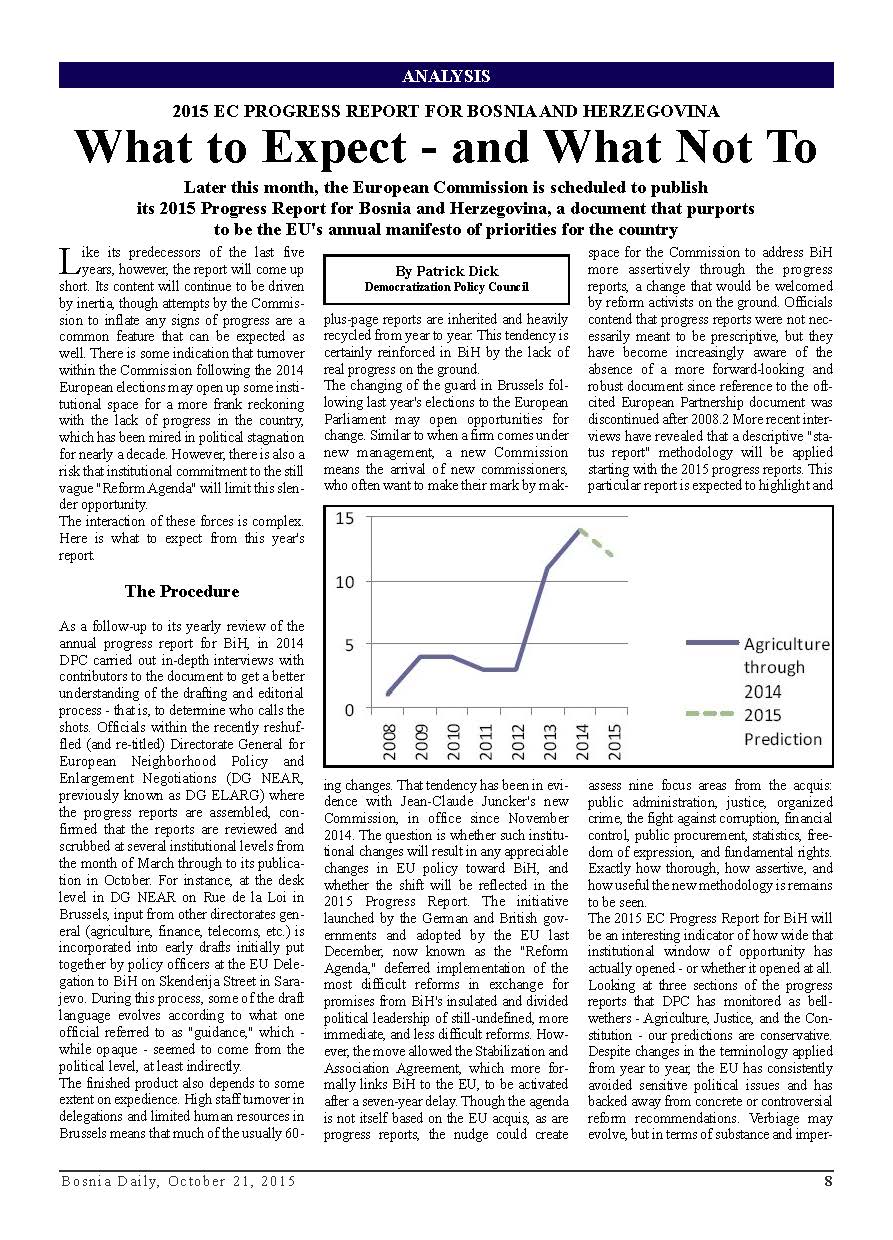
DPC BOSNIA DAILY: What to Expect - and What Not To
Bosnia Daily: October 21, 2015 – What to Expect - and What Not To
More...We kindly inform you that, as long as the subject affiliation of our 300.000+ articles is in progress, you might get unsufficient or no results on your third level or second level search. In this case, please broaden your search criteria.

Bosnia Daily: October 21, 2015 – What to Expect - and What Not To
More...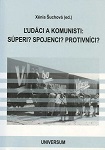
In the First Czechoslovak Republic, Slovakia remained its backward agrarian part because of its less developed economic structure. The Slovak agriculture suffered from unequal distribution of land, which caused the “hunger for land” among the poorest farmers – a majority of the Slovak population. The land reform, expected to solve this problem, was carried out according to laws issued by the Parliament, usually in agreement with the Agrarian Party’s policy. The study briefly outlines the development and results of the reform. It also shows the relations and political attitudes of Hlinka's Slovak People's Party and the Communist Party of Czechoslovakia to the land reform and its accomplishment in Slovakia. The focus is on the 1920s.
More...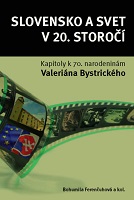
Pri vzniku slovenského agrárneho politického hnutia sa rozhodovalo nielen o konštituovaní agrárnej strany na Slovensku a jej ďalšom politickom osude, ale vzhľadom na jej význam na slovenskej i československej politickej scéne aj o smerovaní celého politického vývoja v medzivojnovom období a jeho neblahom vyústení v roku 1938.
More...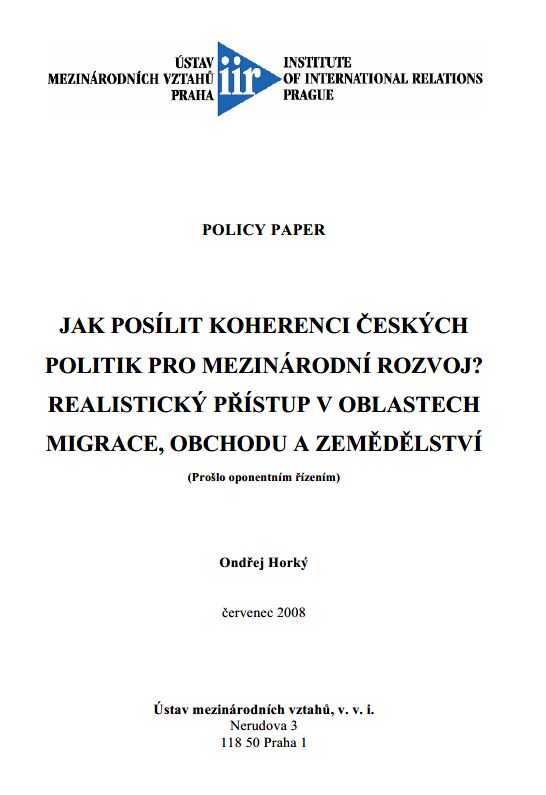
I zdánlivě malé úpravy českých politik v oblasti migrace, obchodu a zemědělství mají velký vliv na rozvojové země, často větší než výrazné navýšení rozvojové spolupráce. Větší zohlednění zájmů chudých zemí v českých politikách je však mimořádně složité kvůli velkému počtu aktérů a jejich odlišným zájmům a institucionálním kulturám. Pokud má však mít česká rozvojová politika smysl, je nutné začít s posilováním koherence politik pro rozvoj co nejdříve. • V oblasti migrace je třeba pečlivě sledovat dopady pilotního projektu řízené migrace a reformovat program vládních stipendií pro studenty a studentky z rozvojových zemí tak, aby nepřispívaly jako dosud k „odlivu mozků“, ale je-li to uskutečnitelné, k jejich „oběhu“, tedy dočasné migraci. Také je nutné usnadnit zasílání remitencí přistěhovalců do rozvojových a transformujících se zemí a výhledově zapojit do rozvoje jejich diaspory. • V oblasti mezinárodního obchodu a zemědělství musí příslušné rezorty především plnit programové prohlášení vlády, které jim ukládá brát v potaz dopady obou politik na rozvojové země. Česká republika by měla prosazovat svoji spíše liberální pozici především také v bourání bariér na straně rozvinutých zemí. Společně je třeba přizvat Exportní garanční a pojišťovací společnosti k dialogu o mezinárodním rozvoji i proto, že v oblastech obchodu a zemědělství neexistuje shoda ohledně jeho významu.
More...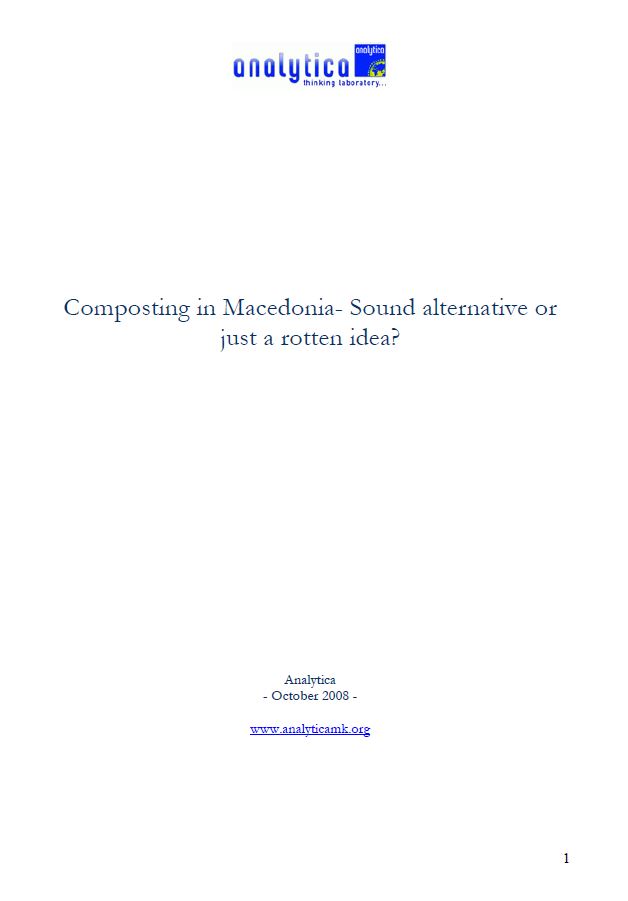
In the European Union (EU) with 497 million inhabitants, biowaste accounts for 30-45% of the municipal solid waste (MSW). While in Macedonia, a country with only two million inhabitants has biowaste percentages near the percentage of the EU - 26.2%. In Macedonia biowaste includes waste materials with organic (animal and vegetal) origin, like household waste, then restaurants, canteens food waste and green markets waste, as well as in the rural municipalities, agricultural wastes, wastes from livestock activities, gardening wastes and forest residues. Due to the high water content, high density (except for green waste which has low density) and the high putrescibility of this waste stream, it is crucial to be involved in integrated, sustainable waste management. The MSW and its biowaste stream produced in Macedonia is landfilled (at official landfills) and dumped at thousands of illegal dumpsites. Furthermore, there is no separate collection of biowastes, only separate collection of paper as biowaste is realized by the communal enterprises. Additionally, the rural communities with main agricultural activities do not have official waste collection systems. The treatment of the agriculture wastes depend solely on the treatment practices of the farms. Because the agriculture sector in Macedonia lacks the Good Farming Practice (GFP), non compliance to basic technical and environmental requirements is often the case with the macedonian farms. This leads to pollution of soils, water courses and emissions of greenhouse gases (GHG) on the long run.
More...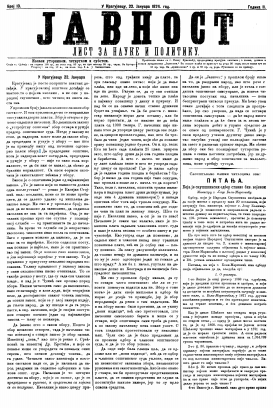
У Крагујевцу 22. Јануара; ПИТАЊА; Како се подиже пољоделство; Са велике школе; ДОПИСИ; Београд, 18. Јануар; У Књажевцу, 11. 1874. год.; Копривница, 15. Јануара; Јавна благодарност; Јавна коресподенција; Књижевни Огласи; ОГЛАСИ;
More...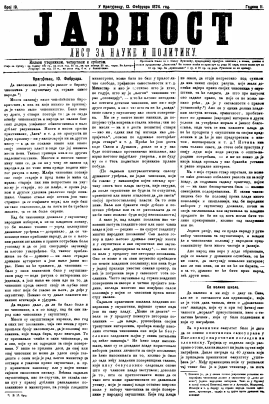
Крагујевац 10. Фебруара; Са велике школе; Из записника Небојше; Народној скупштини: Штудије о стању пољске привреде у Србији; Предлог за нов грађански поступак у округу (кантону) циришком; Спољна политика немачка; ДОПИСИ; Крагујевачка новост; Мојим ђацима у крагујевачкој гимназији; Књижевна вест; ОГЛАСИ; ФАБРИКА ШЕШИРА КОД ЗЛАТНОГ ЧИЛИНДЕРА на бившој Стамбол-капији;
More...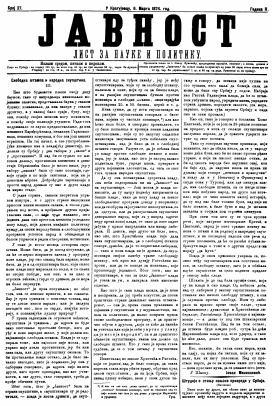
Слободна штампа и народна скупштина; Штудије о стању пољске привреде у Србији; ДОПИСИ; Јевропска дипломација и афера босанска; Београд 27. Фебруара; Баградан 15. Фебруара; РАЗЛИЧНОСТИ; ОГЛАСИ; На знање;
More...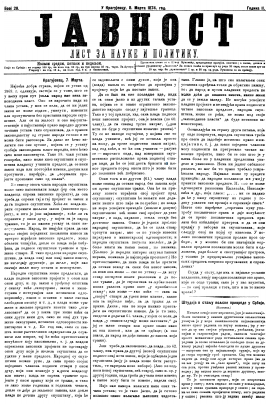
Крагујевац, 7. Марта; Штудије о стању пољске привреде у Србији; Најновији научни предлог; ДОПИСИ; Јевропска дипломација и афера босанска; РАЗЛИЧНОСТИ; Уредништву ''Јавности''; ПРИПОСЛАНО; ОГЛАСИ; На знање;
More...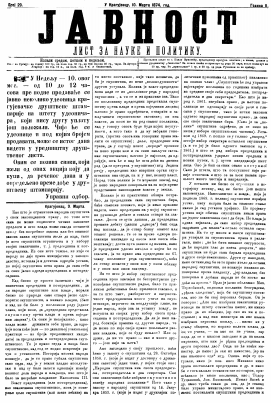
Штудије о стању пољске привреде у Србији; Земљедерско-шумарска школа у Пожаревцу; ДОПИСИ; Београд 28. Фебурара; Јагодина 6. Марта; Пожаревац 24. Фебурара; РАЗЛИЧНОСТИ; ОГЛАСИ; На знање;
More...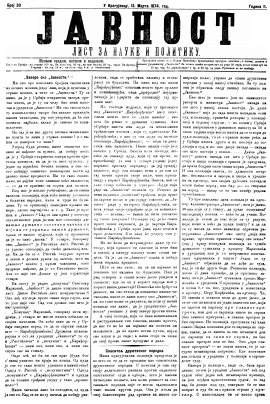
''Завере око ''Јавности'' ''; Спаситељ друштвеног поретка; Штудије о стању пољске привреде у Србији; Земљеделско-шумарска школа у Пожаревцу; ДОПИСИ; Опет спаситељ друштвеног поретка; Јавна благодарност; Ценовник; Књижевни Оглас; ОГЛАСИ;
More...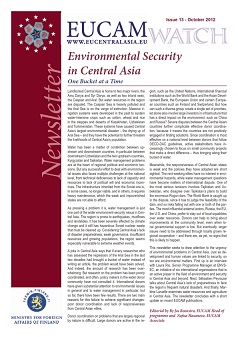
Landlocked Central Asia is home to two major rivers, the Amu Darya and Syr Darya, as well as two inland seas, the Caspian and Aral. But water resources in the region are disputed. The Caspian Sea is heavily polluted and the Aral Sea is on the verge of extinction. Massive irrigation systems were developed in the past to sustain water-intensive crops such as cotton, wheat and rice in the steppes and deserts of Kazakhstan, Uzbekistan and Turkmenistan. These systems have caused Central Asia’s largest environmental disaster – the drying up of Aral Sea – and they have the potential to further threaten the livelihoods of Central Asia’s population.
More...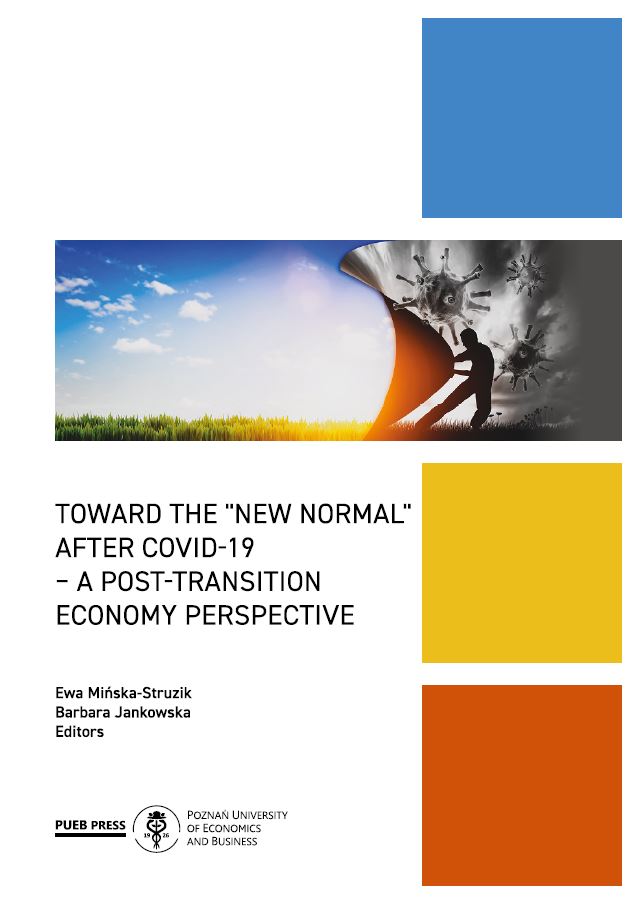
Toward the „new normal” after Covid-19 – a post-transition economy perspective contains a collection of 21 papers addressing the societal, political, economic, and managerial challenges of the post-pandemic world. The book is divided into three parts. Part one touches on the supranational and national level aspects of the Covid-19 pandemic. Part two focuses on business sectors and industries, whereas part three provides the perspective of companies.Authors – researchers from the PUEB’s Institute of International Business and Economics – share their research results, voice concerns, and offer recommendations on creating today’s world more immune to shocks and ready for unknowns. The pandemic of Covid-19 revealed many weaknesses of the global economy, national economies and states, business sectors, and individual companies. It’s undoubtedly the turning point, but simultaneously it’s an opportunity and a spur to change toward the new and sustainable normal.
More...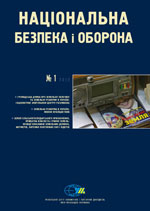
UKRAINE - ON THE EVE OF THE COMPLETION OF LAND REFORM? // PUBLIC OPINION ON LAND POLICY AND LAND REFORM IN UKRAINE // Citizens' assessment of the state's land policy // The situation on the land market // Plans of landowners, tenants and citizensin general for the future // Attitude to the development of large joint-stock agricultural enterprises and farms // Citizens' assessment of the land rights registration system // Legislation governing land ownership: level of awareness and evaluation // Interest in the problem of the land market // Private ownership of agricultural land: attitude, understanding, vision of the optimal model for Ukraine // Attitude to the purchase and sale of land agricultural purpose // Citizens' attitudes towards adoption issues Law "On Land Market" // PROBLEMS OF INTRODUCTION OF THE FREE MARKET OF AGRICULTURAL EARTH: FOCUS GROUP RESULTS REPORT // I. Positions of owners of land plots (shares) // II. Positions of farmers // III. Common positions // IV. Conclusions // ABOUT THE LAND, OR NOTES IN THE FIELDS OF THE PRESIDENT'S INTERVIEW // Introductory retreat // The president - for explanatory work, citizens - for the referendum // How it started // Field Owners: Rights and Opportunities // The results of the first 20 years of reform // About agrarian policy, or What to do? // Conclusion, or For the information of the authorities and citizens // THE LAND OF OUR ANXIETY // Why is this reform needed? // About the price of land and its increase // I need a lot of money… // Land and personal life // Property in our way // So what do we lack to complete land reform? // ATTITUDES OF POLITICAL PARTIES AND THEIR LEADERS TO THE ISSUEOF LAND RELATIONS IN UKRAINE
More...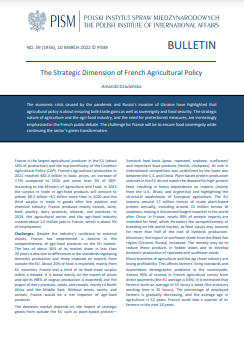
The economic crisis caused by the pandemic and Russia’s invasion of Ukraine have highlighted that agricultural policy is about ensuring both trade gains as well as sovereignty and food security. The strategic nature of agriculture and the agri-food industry, and the need for protectionist measures, are increasingly emphasised in the French public debate. The challenge for France will be to ensure food sovereignty while continuing the sector’s green transformation.
More...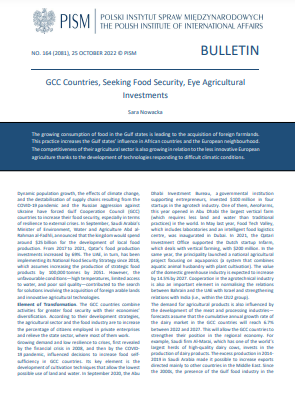
The growing consumption of food in the Gulf states is leading to the acquisition of foreign farmlands. This practice increases the Gulf states’ influence in African countries and the European neighbourhood. The competitiveness of their agricultural sector is also growing in relation to the less innovative European agriculture thanks to the development of technologies responding to difficult climatic conditions.
More...
On 15 February, the member states of the World Trade Organisation (WTO) elected Ngozi OkonjoIweala as Director-General of the organisation. She is the first woman and first African in this position. She will focus on fighting the COVID-19 pandemic, reforming the WTO, and mitigating the effects of the U.S.-China rivalry. Her election likely increases the importance of the interests of the least-developed members of the organisation, which may lead to a revival of talks that are sensitive to the EU, for example, concerning agriculture.
More...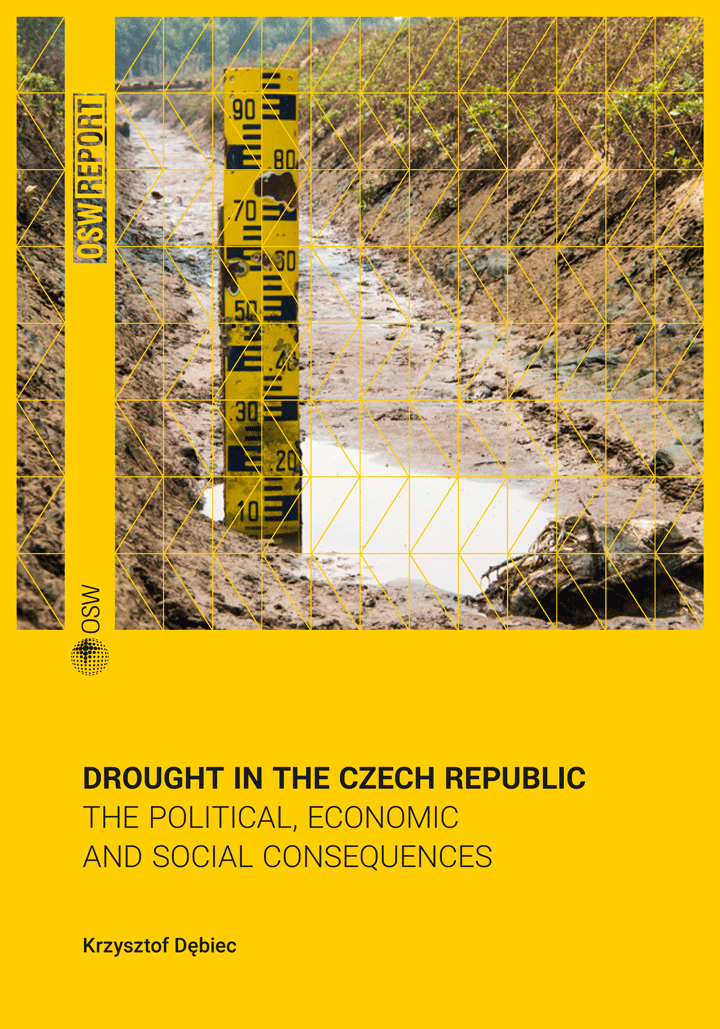
The Czech Republic is an example of a state in which drought has become a key issue in public debate. In the Czech Republic, 2020 was the seventh consecutive year of a drought that is considered the most severe in 500 years, and which differs from the previous ones in that it is more prolonged and is characterised by considerably higher temperatures. At its peak, every fifth municipality was exposed to the risk of water scarcity, which was particularly evident in southern Moravia and in north-western regions. The situation is further complicated by the fact that for many years Prague was focusing on the construction of a flood control system and on the mitigation of the consequences of floods. At present, the Czech Republic has the smallest freshwater resources of all the inland EU member states. Despite a gradual improvement in the situation, recorded since May 2020, the problem involving groundwater scarcity has not been fully eliminated, and experts – taking account of long-term climate change trends and structural problems faced by the Czech agricultural and forestry sectors – are expecting a recurrence of an even more severe drought in a couple of years at the latest. A closer look at the Czech Republic’s struggle with drought may prompt more comprehensive analyses regarding the water management policy pursued in Central Europe, a region which is becoming increasingly affected by recurrent droughts.
More...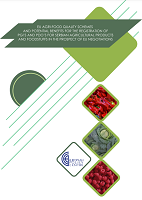
The main objective of this policy paper is to examine different aspects of EU agri-food quality schemes, developed for products with specific characteristics resulting from a particular origin, special ingredients or farming and production methods. The purpose of this paper is to examine in depth different aspects of this European policy and identify potential benefits for Serbian agri-food producers in applying it. Special attention will therefore be dedicated to assessment of Serbian state of affairs in regards, as well as to the opportunities that are now more present, due to the advancement of Serbia’s negotiations with EU. Since many economic findings show, the registration of Protected Designation of Origin (PDO), Protected Geographical Indication (PGI) and Traditional Speciality Guaranteed (TSG) usually results in the higher ability of producers to compete in the market, the paper will attempt to explore the opportunities and problems that the registration of regional and traditional products may bring to the Serbia’s local agrifood production system.
More...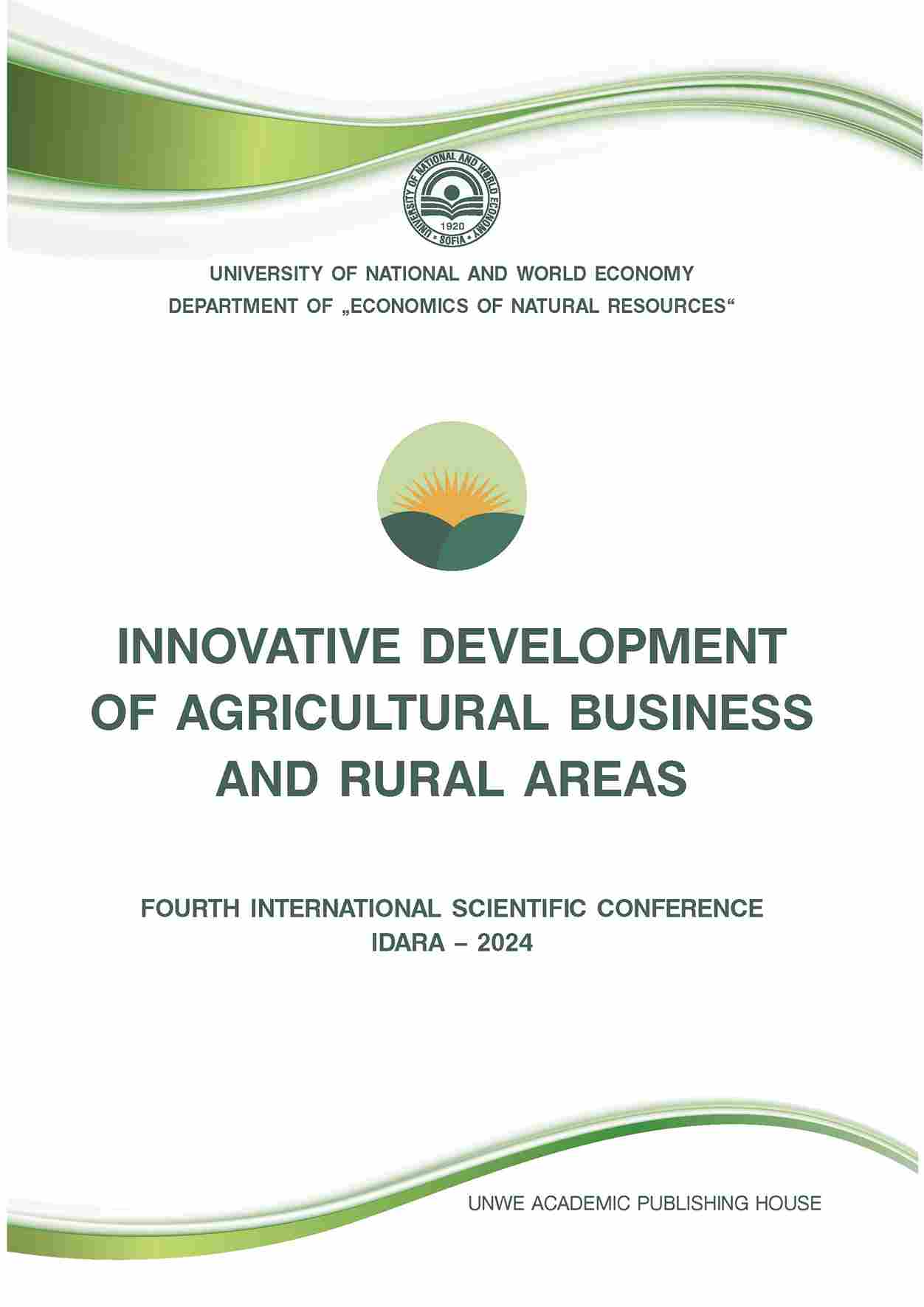
The report explores the pivotal role that digital content plays in shaping consumer behavior in the agricultural business sector. It underscores how digital content impacts the entire customer journey, from the initial exposure to a brand, through the decision-making process, to the eventual purchase and ongoing consumer engagement. The research delves into the marketing funnel, a key model for understanding how businesses can guide potential customers through various stages-awareness, interest, evaluation, decision, and loyalty-ultimately transforming them into loyal advocates of the brand. In agribusiness, where traditional practices have long dominated, the integration of digital strategies has become indispensable. The report identifies several strategic components of the marketing funnel that agricultural enterprises can leverage to optimize their digital presence. These components are essential not only for attracting new customers but also for maintaining long-term relationships with them. By utilizing various digital channels such as social media, content marketing, search engine optimization (SEO), and targeted advertising, agricultural businesses can engage their audience more effectively at different stages of the customer journey. One of the core findings of the research is the importance of creating a cohesive digital strategy tailored to the specific needs of agricultural businesses. This involves selecting the right mi of digital channels and tools to reach potential customers, raise awareness, and eventually drive conversions. The study emphasizes that, in today's fast-evolving digital environment, agricultural enterprises cannot rely solely on traditional marketing techniques. Instead, they must adopt digital tools that allow for better personalization and interaction with customers. This not only enhances customer satisfaction but also builds stronger brand loyalty. Furthermore, the report highlights the critical role that innovation and technology play in modern agribusiness. The adoption of cutting-edge technologies, such as data analytics and automation, can significantly enhance the effectiveness of digital marketing campaigns. Investing in analytical tools allows businesses to track consumer behavior and finetune their marketing strategies for maximum impact. In addition, training staff in digital technologies is key to ensuring that these strategies are implemented effectively. In conclusion, the report recommends that agribusinesses expand their digital presence by adopting innovative technologies and developing comprehensive digital marketing strategies. This includes investing in tools that provide insights into consumer behavior and offering training programs to build digital competency within the workforce. By doing so, agricultural enterprises can improve their competitiveness, foster customer loyalty, and thrive in the rapidly changing business environment.
More...